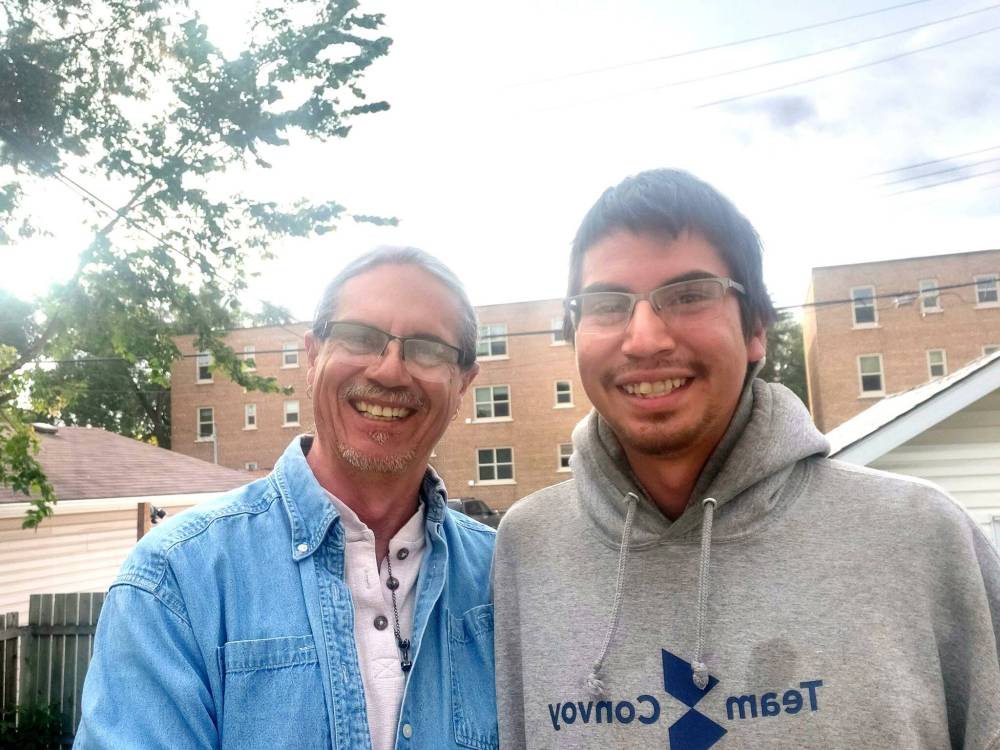Think twice; no drug is safe.
That’s the message from Joseph Fourre, whose son died after taking a drug tainted with fentanyl.
Harlan Fourre, 31, was not one to take illicit drugs, but one bad decision cost him his life nearly a year ago.

Supplied
Joseph Fourre (left) says one bad decision cost his son Harlan (right) his life. The younger Fourre died after taking a recreational drug tainted with fentanyl.
“Nobody’s really talking about recreational drug use,” Joseph Fourre said last week, after Manitoba’s chief medical examiner released preliminary data that shows there were 445 drug-related deaths last year, down slightly from 467 in 2022 and up from 432 in 2021.
Fourre created the Singing Red Bear Foundation, in honour of his son’s traditional name, last fall to raise awareness of the danger of recreational drug use.
“Certainly, we have addiction issues in our province and our city, but nobody was really talking about the young people maybe considering trying something for the first time, or buying that gram of cocaine thinking they were going to party that night — that was being lost,” said Joseph.
“So my motivation behind this was to bring awareness to that aspect of this opioid crisis that we find ourselves in.”
He started a campaign called “No Thanks, I’m Good” — a phrase Harlan often used when offered illicit substances. The campaign is aimed at encouraging youths and others not to take street drugs that could be tainted with fentanyl.
Harlan, a hard-working roofer and member of Norway House First Nation who had five siblings, went to The Pas to work last spring. On April 22, he took a drug he thought was MDMA — known as — ecstasy, at a bar with co-workers.
He and three other men collapsed; they’d overdosed on fentanyl. Emergency responders administered OD-reversal drug naloxone. Three of them were hospitalized in The Pas and released, but Fourre’s son was flown to Winnipeg to try to save his life.
He was taken off life-support after doctors discovered he had a catastrophic brain injury.
“I don’t know why he said yes that night… maybe it was peer pressure, maybe he had one too many beer, I don’t know,” Fourre said.
The Pas RCMP said at the time that two other overdoses were reported at the bar hours later.
Joseph said he thinks recreational drug users have been lulled into a false sense of security; they believe that because they don’t use opioids, they’ll be OK.
“Well, my son probably thought he was going to be safe that night, thinking they were just going to do ecstasy… and it was laced, and that’s the real message right there, that recreational drugs aren’t safe,” he said.
“If you don’t want to die, then say, ‘No thanks, I’m good’ when it comes to recreational drug use, because it’s not safe anymore.”
Fourre, who has had posters and pamphlets with his message made and has flown to northern Manitoba communities to talk to young people, hopes to take his campaign to a wider audience in Canada.
He said many young people he’s talked to did not know that some illicit substances may be tainted.
Fourre said he thinks awareness campaigns in decades past that encouraged abstinence were scoffed at by many, but illicit substances have become more dangerous in recent years.
“We wanted to take the approach that, if you choose to take drugs, here’s what’s happening. The safest way now to stay alive is to adopt, ‘No thanks, I’m good,’” he said.
“There is such a rash of tainted drugs out there now.”
He said he thinks harm-reduction and safe-consumption sites have a place in addressing the opioid epidemic, but such measures wouldn’t have kept his son alive.
“What we really need is a balanced approach to this crisis that we find ourselves in,” said Fourre, who is in recovery from opioid addiction.
“Yes, we need harm reduction… does it come in the form of a safe consumption site? I don’t know. But we also need to balance that out with messaging.”
erik.pindera@freepress.mb.ca

Erik Pindera
Reporter
Erik Pindera reports for the city desk, with a particular focus on crime and justice.